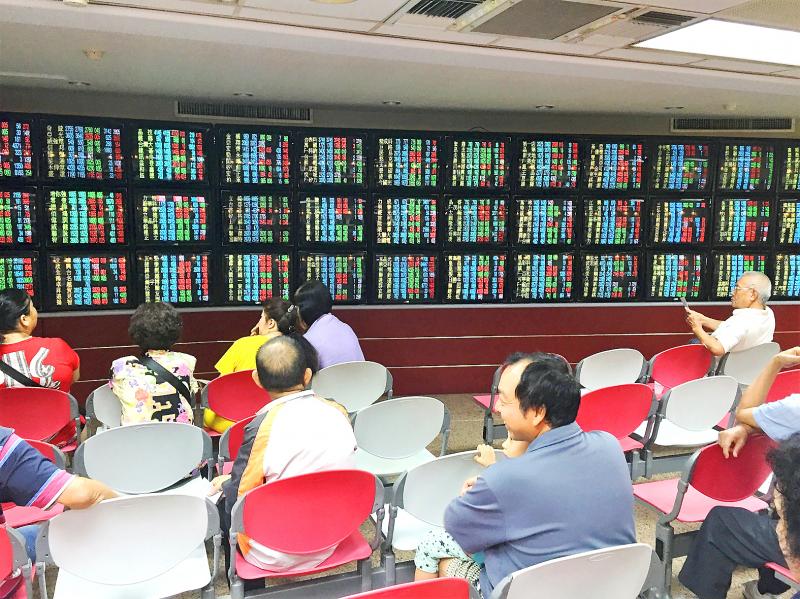The TAIEX would hover at about 17,470 points at the end of this year, with the weighted index witnessing more volatility in the third quarter due to uncertainty over the US’ monetary policy, UBS Securities Pte Ltd, Taipei Branch said yesterday.
The TAIEX yesterday closed up 0.07 percent at 17,075.55 points, down 3 percent from a record high of 17,595 points on April 27, but up 16 percent year to date, Taiwan Stock Exchange data showed.
The benchmark index is likely to remain at this high level at the end of the year, despite a spate of COVID-19 infections, as solid corporate revenues and exports should support the index, UBS analyst Ally Chen (陳玟瑾) told a videoconference.

Photo: Kelson Wang, Taipei Times
“For those companies we cover, we estimate their combined profits would grow more than 30 percent this year from last year,” she said.
Although the TAIEX fell after COVID-19 cases surged last month, it has quickly recovered, she added.
However, “huge volatility” in Taiwanese equities is also possible next quarter, as local stocks would be affected once the US Federal Reserve announces new liquidity-tightening measures, she said.
In 2013, when the Fed announced that it was ending its bond-buying program, which it began in 2008 in response to the financial crisis, the news took a toll on local stocks, Chen said.
However, by the time the Fed started reducing its purchases in 2014, local stocks had regained their momentum due to solid fundamentals, she said.
“Therefore, we might see a similar impact on the TAIEX next quarter, and we suggest investors avoid overpriced stocks that are less resilient to a tighter monetary policy,” Chen said.
Investors are also advised to monitor several key gauges, including corporate revenues, growth in demand for end products from the US and Europe after COVID-19 lockdown measures end and inflation’s effect on corporate earnings, she said.
Asked if local shipping stocks would remain strong due to rising freight rates, UBS head of Taiwan research James Kan (甘清仁) said that COVID-19 vaccination programs would play a role in it, because if more people are able to return to their posts, supply chain disruptions and port congestion would be relieved.
The vaccination rate in the US is predicted to hit 60 percent next month, which would normalize many businesses, he said.
“It is hard to imagine that freights rates would remain that high for long,” Kan added.

South Korea’s equity benchmark yesterday crossed a new milestone just a month after surpassing the once-unthinkable 5,000 mark as surging global memory demand powers the country’s biggest chipmakers. The KOSPI advanced as much as 2.6 percent to a record 6,123, with Samsung Electronics Co and SK Hynix Inc each gaining more than 2 percent. With the benchmark now up 45 percent this year, South Korea’s stock market capitalization has also moved past France’s, following last month’s overtaking of Germany’s. Long overlooked by foreign funds, despite being undervalued, South Korean stocks have now emerged as clear winners in the global market. The so-called “artificial intelligence

‘SEISMIC SHIFT’: The researcher forecast there would be about 1.1 billion mobile shipments this year, down from 1.26 billion the prior year and erasing years of gains The global smartphone market is expected to contract 12.9 percent this year due to the unprecedented memorychip shortage, marking “a crisis like no other,” researcher International Data Corp (IDC) said. The new forecast, a dramatic revision down from earlier estimates, gives the latest accounting of the ongoing memory crunch that is affecting every corner of the electronics industry. The demand for advanced memory to power artificial intelligence (AI) tasks has drained global supply until well into next year and jeopardizes the business model of many smartphone makers. IDC forecast about 1.1 billion mobile shipments this year, down from 1.26 billion the prior

Chinese artificial intelligence (AI) start-up DeepSeek’s (深度求索) latest AI model, set to be released as soon as next week, was trained on Nvidia Corp’s most advanced AI chip, the Blackwell, a senior official of US President Donald Trump’s administration said on Monday, in what could represent a violation of US export controls. The US believes DeepSeek will remove the technical indicators that might reveal its use of American AI chips, the official said, adding that the Blackwells are likely clustered at its data center in Inner Mongolia, an autonomous region of China. The person declined to say how the US government received

People stand in a Pokemon store in Tokyo on Thursday. One of the world highest-grossing franchises is celebrated its 30th anniversary yesterday.